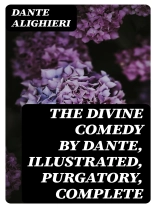Dante Alighieri’s ‘The Divine Comedy: Illustrated, Purgatory, Complete’ is a monumental literary work that navigates the complex realms of the afterlife through the allegorical journeys of its protagonist, Dante himself. With a rich tapestry of deeper meanings woven into its terza rima verse form, this section, Purgatory, explores themes of redemption, sin, and divine grace. Dante’s evocative imagery and profound philosophical inquiries create an immersive experience, inviting readers to reflect upon their own moral and spiritual dilemmas within a vivid framework of Catholic theology and 14th-century Florentine culture. Dante, often hailed as the father of the Italian language, crafted this seminal work during his exile from Florence, drawing upon his personal experiences of loss, love, and faith. His profound dissatisfaction with the political landscape of his time permeates the text, as he employs allegory to critique societal injustices while articulating a vision of transcendent truth. This blend of autobiography and universal spirituality showcases Dante’s mastery of poetic form and his enduring legacy as a moral philosopher. Readers are highly encouraged to engage with ‘The Divine Comedy: Illustrated, Purgatory, Complete’ for its rich artistic and intellectual substance. Through its intricate layers of symbolism and poignant narrative, the text serves not only as a historical artifact but also as a timeless guide to understanding the human condition’s existential trials and tribulations.
Giới thiệu về tác giả
Dante Alighieri (c. 1265–1321), also known simply as Dante, is universally acclaimed as one of Italy’s foremost poets. He is best known for his monumental epic poem, ‘La Divina Commedia’, or ‘The Divine Comedy, ‘ a seminal work that has influenced not only Italian but also Western literature and philosophy. Dante’s ‘Comedy’ is often considered the greatest literary work composed in the Italian language and a masterpiece of world literature. In this narrative poem, Dante employs the vernacular Italian in lieu of Latin, a stylistic choice that helped shape the modern Italian language. ‘The Divine Comedy’ is an allegorical vision of the afterlife, divided into three parts: ‘Inferno’, ‘Purgatorio’, and ‘Paradiso’. While ‘The Divine Comedy’ discusses a wide range of theological, ethical, and political themes, it is also remarkable for its intricate structure based on the number three, symbolizing the Trinity, and its use of terza rima, a rhyming verse stanza form. ‘Purgatory, ‘ the second part, explores themes of repentance and moral purification. Throughout the poem, Dante is guided by the Roman poet Virgil and later by Beatrice, whom he regarded as the embodiment of divine love. His work transcends the mere religious allegory to offer profound reflections on humanity’s quest for divine truth and personal salvation. Dante’s influence is evident in literature, art, and pop culture references centuries after his death.












